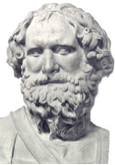 The Ancient Greek poet known as Stesichorus is generally accepted as being one of the first lyric poets of the Western World. He takes his place in a group known as the ”Nine Lyric Poets”, in the company of others such as Pindar of Thebes, Sappho of Lesbos and Simonides of Ceos, who were all around during the 5th, 6th and 7th centuries BC. The work of Stesichorus, according to many scholars, has “Homeric” qualities in that his poems tell an often epic tale of great deeds perpetrated by heroes fighting tyrants. He also wrote verses both insulting and honouring the great Queen of Laconia, otherwise known as Helen of Troy.
The Ancient Greek poet known as Stesichorus is generally accepted as being one of the first lyric poets of the Western World. He takes his place in a group known as the ”Nine Lyric Poets”, in the company of others such as Pindar of Thebes, Sappho of Lesbos and Simonides of Ceos, who were all around during the 5th, 6th and 7th centuries BC. The work of Stesichorus, according to many scholars, has “Homeric” qualities in that his poems tell an often epic tale of great deeds perpetrated by heroes fighting tyrants. He also wrote verses both insulting and honouring the great Queen of Laconia, otherwise known as Helen of Troy.
Accounts vary about his birthdate, with some saying the year 640 BC and others 630 BC, but his place of birth was Metauros, a town in the southern part of Italy now known as Gioia Tauro. His birth name was Tisius and he was born into an educated, and presumably affluent, family, where his two brothers were skilled in mathematics and the law respectively. Stesichorus had a talent for writing in the Doric dialect and it is believed that he produced somewhere in the region of twenty six books. Unfortunately very little of his original material still survives. Perhaps he was not well enough respected as a writer and, thus, his work would not have been preserved in the way that others of his era was.
An interesting point about his adopted name, Stesichorus, is that he was so named because he was the originator of the idea of establishing (stesai) a chorus of singers accompanied by an instrument called the cithara. The modern-day term for this instrument is the stringed instrument used in almost all forms of music – the guitar. Legend has it that his relationship with Helen of Troy began with an abusive poem written about her and, for his pains, he was blinded (probably deliberately, by her bodyguards). He got back into her good books though by writing a lyrical piece known as an encomium, called The Palinode which lavished praise upon her and completely contradicted his original work. For this his sight was miraculously restored.
As mentioned above, he was known for his epic pieces of work but he also wrote very short poems as well, and here is an example called Season of Song:

Stesichorus was one of the Dorian Greeks, one of the four ethnic groups who were scattered beyond the Greek Islands, hence his place of birth being southern Italy. His work pandered to the tastes and desires of this Doric diaspora, of which Helen of Troy was one. He wrote vivid descriptions of rivers and mountains and the land that their ancestors had once occupied, and it seems that many liked his work, even if scholars in subsequent years criticised it to some degree.
Some gave him the name “genius” though, praising his songs about great military commanders, usually sung while playing the stringed instrument called the lyre. Perhaps he over-elaborated in these stories and, had he been a little more subtle, he might have been considered a contemporary of Homer.
The fact is though that the name of Stesichorus has survived and his work is still known, more than two thousand years after his death. It is believed that he died in Katane, a place now called Catania, on the island of Sicily. The year of his death was 555 BC so he would have lived to an age somewhere in between 75 and 85 years old.

